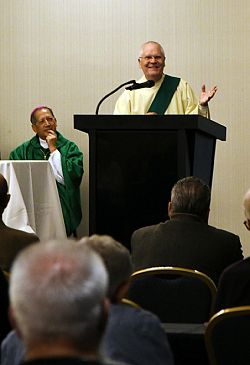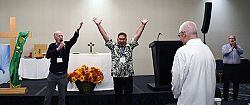Deacon Greg Kandra leads deacons’ retreat
Friday, Oct. 10, 2025

Intermountain Catholic
Photo 1 of 2
Deacon Greg Kandra gives the homily at the Oct. 5 Mass during the annual diocesan deacons’ retreat. Bishop Oscar A. Solis (left) presided at the Mass. IC photo/Marie Mischel
PROVO — Diocesan deacons and their wives gathered Oct. 3-5 at the Marriott Hotel and Conference Center in Provo for their annual retreat. Deacon Greg Kandra, who writes the blog “The Deacon’s Bench,” was the retreat master.
In his presentations, Deacon Kandra spoke on the ministry of the diaconate, which is to serve. He began his first talk by noting that Catholics, by becoming what they receive in the Eucharist, “are transformed biologically, spiritually, chemically. … Here we take into our beings the Savior of the world. He becomes us, we become him, and by extension we should become like him.”
Prayer is important, he added, and like Christ “we should become people of prayer, people in dialogue with Almighty God, people eager to listen to him and to do his will.”
Sometimes “the most important work a deacon can do with his hands is simply to fold them in prayer,” he said.
There are many formal ways to pray, including the Liturgy of the Hours, the rosary and grace before meals, but he suggested that prayer is also “part of who we are and how we live. … When an ordinary Catholic sees a deacon exercising his ministry they are seeing more than a deacon on a job, they are seeing a deacon at prayer. Our actions are our offerings: these are our litanies, our psalms, our hymns, our chaplets – they are part of who we are and what we do. A deacon prays on his knees but also on his feet; he prays with his hands and with his heart.”
Preaching is another form of prayer, he said, noting that the “homily can and should be considered an offering to God and his people.”
A deacon’s ministry of charity and presence “is a prayer offered to God on behalf of another,” he said. “It is prayed every time we make ourselves available to another, every time we accompany another person on the difficult journey of life.”
While anyone can do this ministry, deacons make it a way of life because they have taken a vow to serve, not to be served, Deacon Kandra said.
In his second talk he spoke about the challenge of living out the Sacrament of Marriage while also living out the Sacrament of Holy Orders. He suggested deacons and their wives pray together as a couple as well as a family, which “can’t help but shed grace on the Sacrament of Holy Orders and the Sacrament of Marriage and vice versa,” he said.
In addition, he suggested that they recall every day “the joy of this glorious vocation, the joy in the ministry that you share as a couple, the joy in the way you have answered God’s call and continue to answer it every day. Pray in thanksgiving for all that God has given you – for all that he has given us – and trust that he will stay close to us.”
Similarly, in his last presentation Deacon Kandra suggested that the deacons recall frequently what brought them to their vocation, and to say prayers of thanks for all who supported them along the way, which is “a journey of faith and hope and love.”
In his homily during the Sunday Mass, Deacon Kandra said that the message he hoped the deacons and their wives take home from the retreat is that, through the Eucharist, “we become what we receive and … by becoming what we receive we are called to be Christ to a weary, broken world, to be heralds of hope, and we do it, of course, as an act of faith, because we walk by faith, not by sight.”
Bishop Oscar A. Solis presided at the Mass. In his comments, the bishop, speaking in English and Spanish, said it was “a great joy to be here with you, my partners … in the mission of evangelization in the Diocese of Salt Lake City.” He added that he was grateful that the deacons are an important part of the diocese’s mission and are “ready and eager to proclaim the Gospel of Love to the people entrusted to our care.”
The bishop told the deacons that people with mature faith should make a priority of having God in their lives and trusting in him. They should also follow the example of the Blessed Mother and her ‘yes’ to God, he said. “A mature faith is a faith that seeks first the Kingdom of God, knowing that if we put our lives in trust to God everything will be given us.”
As he closed his remarks he urged the deacons to defend “human life – life from the moment of conception to natural death,” and asked them to avoid political issues but rather “remain as authentic ministers of the Church that recognizes the absolute truth of life from the moment of conception until natural death.”
He also asked the deacons to promote vocations to the priesthood, religious life and the deaconate.
For questions, comments or to report inaccuracies on the website, please CLICK HERE.
© Copyright 2025 The Diocese of Salt Lake City. All rights reserved.
© Copyright 2025 The Diocese of Salt Lake City. All rights reserved.


Stay Connected With Us